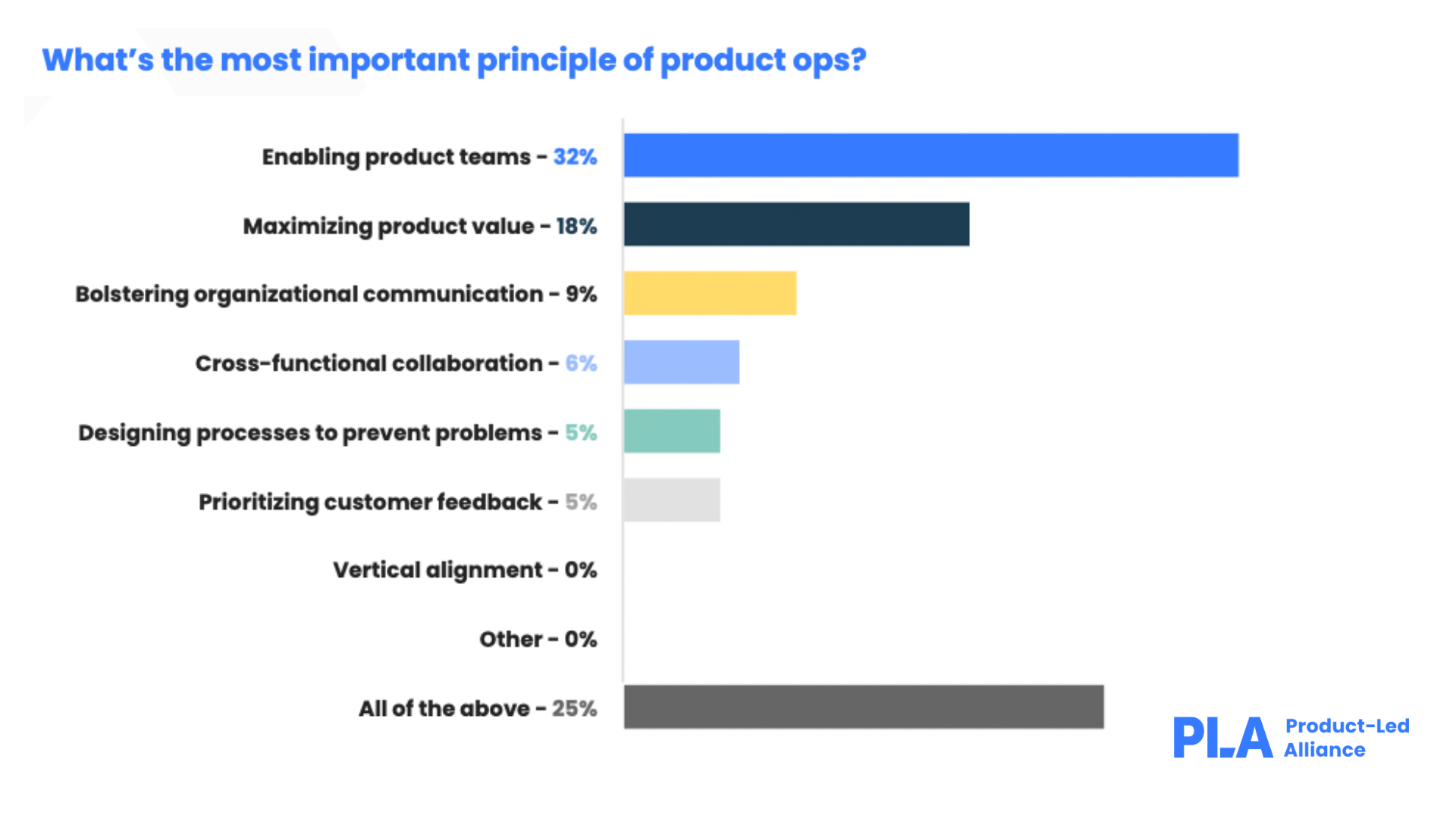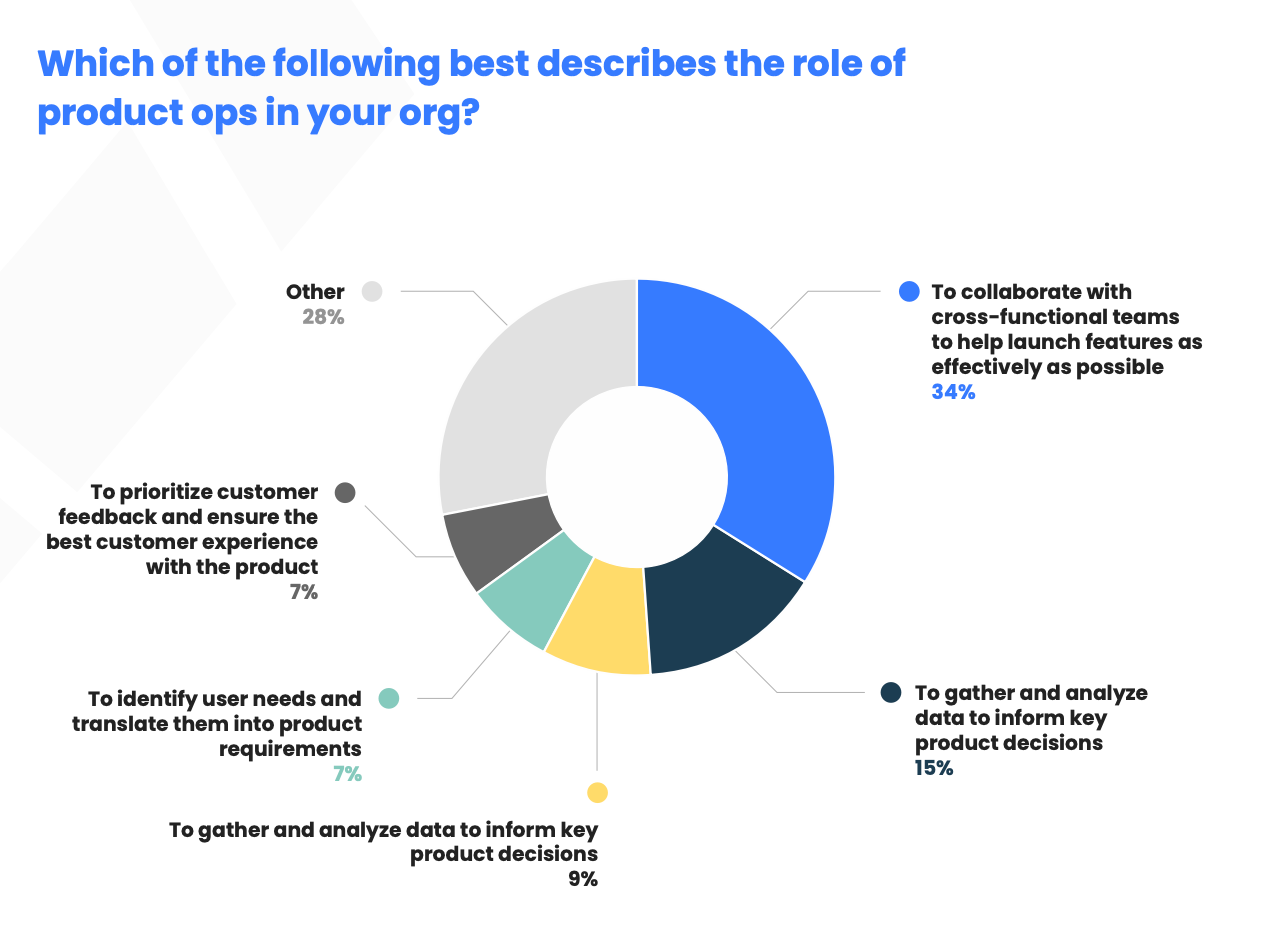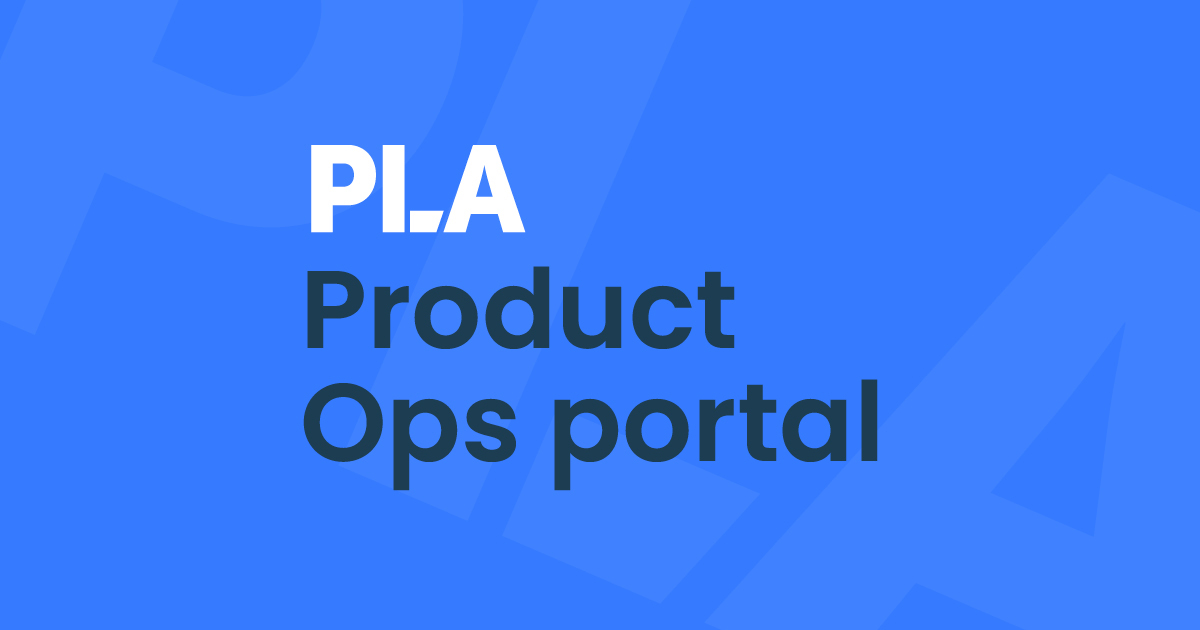Product ops (short for product operations) is fast becoming the backbone of product-led growth within organizations and is an operational function designed to help align and optimize the communication and processes around product teams.
But there’s still so much to be learned and shared in this space. So if you’re looking for inspiration, insights, and more - here’s the place you need to be.
With an ever-increasing amount of content and conversation around the emerging product ops function, we wanted to create the perfect space to take a deep dive into the position and explore the role and responsibilities of product ops, the key skills, the evolution of the function, and much more.
Throughout this hub, we'll be covering key product operations topics like:
- What is product operations?
- Defining product ops
- Key responsibilities.
- The pillars of the function.
- Building a product operations team.
- Hiring for product ops.
What is product operations (product ops)?
Product Operations is a critical function within a company that bridges the gap between product development and the broader organization's operational aspects. It encompasses the processes, strategies, and methodologies aimed at ensuring the seamless execution of a product's lifecycle, from conception to delivery and beyond. Product ops is like the glue that holds everything together.
Product Operations professionals collaborate closely with cross-functional teams, including product managers, engineers, designers, and marketing specialists, to streamline workflows, optimize resource allocation, and enhance overall product quality.
Their role involves managing project timelines, tracking key performance metrics, coordinating product launches, enabling product teams, and facilitating effective communication between departments. By maintaining a holistic view of the product's journey, product operations contributes to improved efficiency, increased customer satisfaction, and the successful realization of a company's strategic objectives.

The rise of this new discipline within the product management landscape has been swift and mighty to watch. It’s been powering product excellence and supporting growing product teams at a rapid rate. So much so that 89% of those we surveyed for our first State of Product Ops Report, already had a product operations function in place.
So, it’s sort of been around for a while. Product operations, product ops, or prod ops, had been a role geared, almost exclusively, towards large silicon valley tech companies. But the function has been gaining pace across orgs of all shapes and sizes.
The primary objective of the function is to assist the product team, but instead of just existing as a mere supporting role, product ops teams actually play a vital part in product development and delivery.
Product ops essentially exists to help product managers (PMs) curate the best experience for users and steer product management teams in the right direction to make prioritization decisions. Of course, it’s always critical to optimize the processes a user goes through while experiencing the product, and the function of product ops has become vital for connecting teams who are building a product; from engineering to customer success and sales.
What are the key responsibilities of product operations managers
Of course, the key responsibilities of the function can vary depending on the org, but there are some consistent areas that have become tied to the role.
Supporting the onboarding process
As product teams scale quickly, it’s important to ensure new hires are able to get up to speed in the most efficient way possible. New members of the team need to be able to adapt, plug in and keep up with the current team, without slowing them down.
Product operations can make this process a whole lot easier, by helping to clearly define an effective onboarding process. They can outline a clear path from day one that helps new hires integrate quickly and smoothly, to become a productive member of the team.
“The hiring and performance evaluation processes are a key part of product ops (in partnership with HR, of course).”
Chris Butler
Streamlining critical and routine tasks
During product development, there will be repetitive tasks that can take up a large amount of a product team’s time. From analyzing feedback to roadmapping and interviewing users, these tasks can slow down the progress of any product team.
Prod ops can manage these tasks and identify ways to streamline the processes involved, to ensure they take less time to complete and help the product team achieve more impactful results.
Managing the right tools
Product managers have a wide variety of tools available to them, and over the last few years, the tool stack has only continued to grow. PMs now seemingly have a tool for every need, from user testing to analytics and roadmapping. Safe to say, it can all get a little overwhelming.
Product teams are of course capable of managing all these tools but this can impact productivity. Prod ops can accurately identify the needs of the product team, manage and optimize the stack accordingly. They can build a stack of tools that specifically cater to the needs of the team, which ensures less time wasted shuffling through tools and allows PMs to focus on actually building the product.
Staying on top of best practices
Product-led growth is constantly changing, and PMs need to be flexible enough to adapt to changing trends, methodologies, and best practices in order to really maximize productivity and stay competitive.
Product operations can greatly help product teams by keeping fully up to date with these changing trends. They will be able to identify the methodologies and practices that cater to the specific needs of the product team, highlight areas of improvement and boost efficiency.
Ensuring resources and data are easily accessible
PMs need to manage huge amounts of data and resources during the product development process. In order to boost efficiency and productivity, PMs need access to these resources and key data at crucial stages to improve the product and back up repeatable tasks.
An effective product ops team will be able to identify and organize the right resources and manage crucial data to empower product teams. This can include story templates, user guides, frameworks, etc. Prod operations can ensure resources can be accessed and key insights can be accessible from relevant data whenever required.
Managing user feedback
Successful product-led growth relies on product usage as the primary driver of acquisition, conversion, and expansion, and happy users are of course critical to this. The product experience is the user experience, and analyzing feedback is essential to growing quickly and efficiently.
Product ops can play a central role in leveraging user feedback by handling how this valuable process is managed. They can not only help to improve the user experience by collecting feedback across highly engaged channels. But also facilitate improvements through translating feedback to product teams, as well as analyzing, testing, and experimenting.
What are the pillars of the prod ops function?
Safe to say when it comes to enabling product teams, product operations managers and product ops teams have got things covered. Helping product leaders and their teams accelerate portfolio outcomes is what they do best.

Product ops enables teams through efficiency and consistency
Empowering product teams is the name of the game for product operations, and the function helps the teams to dedicate more time building higher quality features and products, without slowing down to resolve errors.
The less time product engineers spend fixing issues and bugs the better - and product ops can reduce this time by identifying and investigating user issues, analyzing key quality metrics, conducting product audits across platforms, and more.
Product ops facilitates vertical alignment with top-down goals and bottom-up innovation
As a product organization begins to scale rapidly, maintaining strategic alignment gets pretty tricky. So it’s important to have the right processes in place. Product operations can create these processes. And in turn, help with strategy planning, prioritization and allow teams to reach their key goals.
Product ops orchestrates cross-team collaboration with product teams and stakeholders
It goes without saying that product managers need to effectively communicate with their teams. And product ops can establish stronger processes for more effective cross-team communication and knowledge sharing. Product ops teams can work to build shared channels, create templates for status updates and reviews, and more.
Explore more on the pillars of product ops and how the function is accelerating portfolio outcomes.👇

Keep in mind, for the pillars of product operations to remain standing strong, they must be built upon a solid foundation where an outcome-driven culture and a product portfolio management platform and framework tie everything together.
How do you build a product ops team?
We’ve covered the basics of product operations, but what about establishing a product ops team? Well, there’s no definitive way of course, because how a product ops function looks at a certain organization, depends on the specific needs and problems that need solving in that org.

Before we dive into the nitty-gritty of a product ops team, let's take a quick look at the unique archetypes that have emerged. These product operations archetypes can help employers and prospective applicants to better understand the role and the function of a product ops team
Product ops team archetypes
Roadmap enablers
Product operations can focus on enabling product management through developing rituals and systems to build and operate at scale. Roadmap enablers can work to:
- Establish and maintain a product planning process.
- Streamline decision-making across tech and business stakeholders.
- Develop governance around screens, web pages, and processes.
- Identify and manage multi-team, multi-month, or multi-product line dependencies.
- Collaborate with peers, share tools and expertise that amplify the impact of product operations.
Business analysts
The business analyst product ops team can utilize their analytical skills to extract and transform insights, and fuel product and business decision-making. The business analysts can take charge of:
- Setting up and maintaining business intelligence and experimentation solutions.
- Bridging the gap between technical and non-technical stakeholders.
- Curating, organizing, and documenting product operations data and reporting environments.
- Collaborating with data engineering teams to expand data access and availability.
Product launchers
The product launchers have expertise in business operations and analytics, and they work to operationalize new products across multiple teams. They work closely with tech teams and corporate stakeholders such as finance, legal, and tax to:
- Achieve roadmap alignment.
- Build go-to-market strategies.
- Design experiments and launch products.
- Ensure functional partners are aligned on key objectives for the product.
- Track core business metrics related to the product.
Voices of customer
These act as a medium between users and product, sifting through user channels to identify and stack-rank user pain points. They work closely with the UX research team to understand and interpret customer needs, as well as:
- Build temporary custom solutions for clients,
- Communicate product changes and launches with customer-facing teams.
- Collaborate with product teams on the feasibility of products throughout the product lifecycle.
- Identify key problem areas and/or geographies that will be impacted by the product launch.
- Scoping out possible solutions to address these issues.
Product ops will continue to evolve and so to will these archetypes. Some will likely merge into a unified identity similar to product management while maintaining certain specializations across teams.
As part of the State of Product Ops Report we asked the experts themselves how they would structure a product ops team, here are some examples of their thoughts:
"I’d ideally have a mix of Design Management and an interested ops team. It’s about putting together a group of people interested in the topics and responsibilities and having the time available to dedicate themselves to it."
"To me, it’s a trade-off between having good coverage of the different skills that need to be represented vs having too big of a group that will have a hard time getting time together, etc."
"In terms of both established and start-ups: For start-ups, you’re probably not in a position to hire a dedicated OPS person/ team so I would look for people who are interested in this kind of work and have them set off a certain amount of time per week for ops work. You also need someone from the leadership team to sponsor the work, or even better be an active part of it, to show that it’s taken seriously and is important."
"For more established companies, you will have the resources to hire dedicated people. The danger is that they might get separated from the “real work” if they are not integrated well. So it’s still super important that the CTO/CDO/CPO help drive home the importance of this work and clearly delegate to the team and give them a clear mandate to own and change things."
Bjorn Simonson, Senior Product Operations Manager at iZettle
"We’re currently structured into 2 streams - Product Operations Analyst and Product Operations Manager. Under those, we have Associate, Intermediate (without the word Intermediate) Senior, and Lead levels - same levels as our PM team. I’m at the Director level and manage the team who are all ICs."
Christian MacLean, Director of Product Operations and Merchant Product Strategy at Auctane
Hiring for a product operations team
Building a strong product operations team requires hiring the right people. And one of the first things to do is identify what falls into the right slot. By this, we mean weighing up what you’re going to develop vs. what you’re going to support manually.
You’ll likely be looking to iterate quickly, so it’s important to determine the right team structure, define responsibilities appropriately across the teams, and finally, hire the right kind of people who can take ownership.
A good way to structure a product ops team is to start small. If the team exceeds a critical size, it could prevent you from automating fast enough or mean the things you are doing won’t be scalable.
Look to give project assignments and oversight of each new vertical to each member of the team. And ensure those that you hire are unicorns - people with a good operations know-how, a strong sense of ownership, a good extinct of product and building companies. Finally, make sure they have a real passion for the product or knowledge of a specific vertical.
The product ops team ensures what’s already existing is functioning smoothly to see clients through to the successful completion of their projects. So when selecting candidates, it’s a good idea to search for those who can be almost like chameleons
Look for people who:
- Love to grow and expand to multiple areas,
- Like to learn new things and learn them rather quickly.
- Thrive on seeing a problem they need to solve.
- Are excellent listeners and communicators.
Great product operations managers can identify problems and see what needs to be done to align the product managers and stakeholders. Since prod ops managers will be working with so many stakeholders, it’s likely going to be beneficial to set up interviews with some/most of those stakeholders. This is because the product ops manager will need to have great chemistry with the people they’ll be working with.
When hiring, it’s useful to ask open questions such as:
“Tell me of a time where…”
“How would you start a process with…”
These open questions have no right or wrong answers, but they can allow you to see how the person’s way of thinking aligns with the company and the stakeholders. Keep in mind though, that asking technical questions is also critical when hiring for specific skills that need a technical background, for example, SQL queries or cyber security.
For more on how to understand what you're looking for when hiring for a prod ops position, check out the below 👇

Looking to learn even more from the experts working in product operations? Have a listen to the Product Ops Podcast and get all the unique and actionable insights you need. 👇

For all the expert-written content, on-demand videos, and unique insights on product operations you can handle - check out our Product Ops Portal - right here. 👇




 Follow us on LinkedIn
Follow us on LinkedIn




